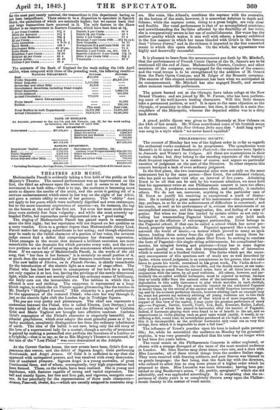PHILHARMONIC SOCIETY.
The concert of Monday last was of the highest order in so far as regards the orchestral works contained in its programme. The symphonies were Mozart's in G minor and Beethoven's Pastorale; the overtures were Spohr's to Jessonda and Winter's to Calypso. All these are masterpieces in their various styles; but they belong to the standing rdpertoire of the Society; their frequent repetition is a matter of course, and argues no particular exertion of judgment on the part of the Directors. In other respects this concert betrayed a lack of even ordinary judgment. In the first place, the two instrumental solos were not only on the same instrument but by the same person—Herr Ernst, the celebrated violinist, who has paid us another visit after an interval of five years. Admitting Ernst to be all that can be said by his warmest admirers, we must hold that his appearance twice at one Philharmonic concert is once too often; because, first, it produces a monotonous effect, and secondly, it excludes others. We do not see, moreover, anything in the particular ease of M. Ernst to justify his receiving so exceptional a mark of distinc- tion. He is certainly a great master of his instrument—the greatest of the day, perhaps, in so far as the achievement of difficulties is concerned; and his music, as well as his performance of it, evinces the attainments of an accomplished musician, and the imagination, fire, and feeling of a man of genius. But when we hear him lauded by certain critics as not only ri- valling but transcending Paganini himself, we can only hold such language as the effusions of extravagant partisanship. Ernst belongs to the Paganini school, if that can be called a school which has never pro- duced, properly speaking, a scholar. Paganini appeared like a meteor, to astonish the world of music,—a meteor which proved to many an ignis fatuns leading them astray from the right path; and among these be- wildered followers we must needs place Herr Ernst. In seeking to emulate the feats of Paganini—his single-string achievements, his complicated har- monics, his mingled bowing and pizzicato—Ernst has in some degree sacrificed quality of tone, and that irreproachable truth of intonation which is essential to a finished violinist- The faults which are the neces- sary consequence of this spurious sort of study are so well described by Spohr, whose sound judgment is as conspicuous as his genius, that we take leave to quote his words, contained in his great work, The Violin School- " The harmonics of the octave, the twelfth, and the double octave, as not mate- rially differing in sound from the natural notes, have at all times been used, in conjunction with the latter, by all good violinists. All others, however, and par- ticularly the so-called artificial harmonics, must he rejected as useless, because they so totally differ from the natural notes of the instrument. It is indeed a degradation to this noble instrument to play whole melodies in such childish, heterogeneous sounds. The great sensation created by the celebrated Paganini in recent times, by the revival of the ancient and wholly forgotten harmonic play- ing and by his eminent perfection therein, however alluring such an example may be, must not prevent my seriously advising all young violinists not to lose their time in such a pursuit, to the neglect of that which is of more importance. In support of this view of the matter, I may quote the greatest performers of every age,—as Pugnani, Tartini, Corelli, Viotti, Eck, Rode, Kreutzer, Baillot, Lafont, &c. —not one of whom has played in harmonics after the manner of Paganini. Indeed, if harmonic-playing were even found to be of benefit to the art, and an improvement in violin-playing such as good taste would justify, it would, in sa- crilicinga full, round tone, be nevertheless purchased at too high a rate; for with this it is incompatible, as the artificial harmonics only come out on very thin strings, from which it is impossible to draw a full tone.'
The influence of Ernst's practice upon his tone is indeed quite percept- ible; for, while he astonished the audience on Monday by his gymnastic exploits, it was very generally remarked that his tone was no longer what it had been five years before. The vocal music at the Philharmonic Concerts it either neglected, or chosen with a strange disregard of the taste of the most musical audience in London. Mr. Sims Reeves sang three times,—two airs and a duet with Miss Lucombe; all of them trivial things from the modern Italian stage. They were received with freezing coldness, and poor Reeves was blamed in no gentle language; the fact being, that the fault lay with the directors, who refused to allow him to sing some pieces of a higher order which he proposed to them. Miss Lucombe was more fortunate; having been per- mitted to sing Beethoven's scene, " Ah, perfido, spergiuro!" which she did admirably, and was applauded accordingly. It is surprising that the ex- perience of thirty years is so completely thrown away upon the Philhar- monic Society in the matter of vocal music.


























 Previous page
Previous page